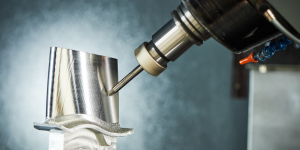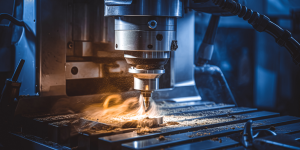CNC Milling gebruikt koper in veel industrieën. Het vormt en snijdt koper met behulp van gebruik CNC-machines. Deze methode is nauwkeurig, tijdbesparend, en goedkope. Koper is een zeer geleidend metaal dat wordt gebruikt in de meeste elektrische en elektronische toepassingen. De hoge thermische geleidbaarheid is gunstig voor koellichamen en koelsystemen. Koper is moeilijk om mee te werken vanwege de hardheid en de onderliggende gereedschapslijtage.
Correcte selectie van gereedschappen en smeermiddel is essentieel voor soepele frezen. Bij het ontwerpen van componenten of producten die koperen attributen gebruiken, zoals elektrische geleidbaarheid en corrosieweerstand, U zou het volgende moeten begrijpen. Als u een fabrikant of ingenieur bent, Effectieve knowhow over materiaalkwaliteiten en bewerkingsprocessen is essentieel om uitstekende resultaten op koper te bereiken CNC-frezen projecten.
1. Wat is koper CNC -frezen?
Numerieke regeling maakt CNC -frezen van koperen vormen en metaalknippen mogelijk. Het wordt in de luchtvaart gebruikt, auto, elektronica, en telecom. Een roterende multi-tanden snijder kan worden gebruikt om materiaal uit het werkstuk te verwijderen en de vereiste vorm te creëren, maat, enzovoort. Koper CNC -bewerking biedt een nauwkeurige en stabiele snijden van ingewikkelde vormen.
CNC -machines zijn veel preciezer dan handmatig frezen. Koper vindt gebruik in elektrische en warmteoverdracht vanwege de geleidbaarheid, en corrosieweerstand. Koper CNC -bewerking creëert ingewikkeld, Nauwkeurige koperen stukken.
2. Waarom kiezen voor koper CNC -frezen?
Koper CNC -bewerking is speciaal in verschillende aspecten. De hoge thermische geleidbaarheid maakt het geschikt in gebruik als koellichaam en ook elektrische componenten. Omdat koper niet corrosief is, bewerkte delen ervan verslijten niet zo gemakkelijk. Koper is een goede geleider van elektriciteit en als zodanig wordt het goed gebruikt in elektronica en telecommunicatie.

Omdat koper ductiel en kneedbaar is, Het is een ideaal metaal om ingewikkelde stukken te maken. Koper is voor een betaalbare prijs en overvloedig waardoor COPER CNC-bewerking kostenefficiënt maakt. Koper CNC -bewerking is lage kosten, veelzijdig, en hoge prestaties maar tegelijkertijd betrouwbaar.
3. Hoe werkt koper CNC -frezen?
Copper CNC-frezen is het proces van het gebruik van computergestuurde machines om koperen materialen nauwkeurig en economisch vorm te geven. Er is een blauwdruk van de freesmachine op basis van een CAD -bestand. Na het CAD -bestand, Een koperen materiaal werd verwijderd en gevormd met behulp van een CNC -machine. In het geval van freesmachines, eindsporen, en ball-mills worden gebruikt om verschillende bezuinigingen te maken naast afwerking.
Snel roterende snijgereedschap verwijder materiaal van koperen werkstukken door ze herhaaldelijk te passeren. Ingewikkelde ontwerpen en complexe vormen zijn mogelijk met de precisieprocedure. Koper CNC -bewerking is nauwkeurig, herhaalbaar, en kan smalle tolerantie onderdelen produceren. Het wordt vaak gebruikt in precisie- en kwaliteitsgerichte industrieën zoals elektronica, ruimtevaart, en auto.
4. Wat zijn de voordelen van koper CNC -frezen?
Copper CNC -frezen heeft verschillende industriële voordelen. De eerste reden waarom koper wordt gebruikt in elektrische componenten is de hoge elektrische geleidbaarheid. CNC -frezen zorgt voor ingewikkelde en exacte geometrieën, Zorgen voor optimale componentenprestaties en functioneren. Koper is ook geschikt voor koellichamen en koelsystemen vanwege de thermische geleidbaarheid.
Effectieve warmtedissipatie voorkomt oververhitting en verlengt de levensduur van de gadget. Toepassingen in ernstige omgevingen of corrosieve stoffen vereisen de corrosieweerstand van koper. CNC-frezen creëert langdurige koperen delen. De kneedbaarheid van koper zorgt voor geavanceerde en unieke patronen. Koper CNC-frezen is veelzijdig en kosteneffectief voor veel productiedoeleinden.
5. Overwegingen voor koper CNC -frezen:
Koper CNC -bewerking heeft verschillende essentiële factoren. Het juiste snijgereedschap moet eerst worden gekozen. Omdat koper delicaat is, Freesapparatuur moet worden gesneden zonder schade aan te richten. De snijsnelheid en het voedingssnelheid moeten ook worden aangepast voor de beste resultaten. Koeling en smering zijn cruciaal tijdens het slijpen van koper.

De warmte van frezen kan metaal uitbreiden, het veroorzaken van kromtrekken of vervorming. Deze problemen kunnen worden verminderd met de juiste koeling en smering. Eindelijk, Om precisie en prestaties te garanderen, De CNC -freesmachine moet periodiek worden geïnspecteerd en onderhouden. Smeer bewegende delen en inspecteren op slijtage en schade zijn inbegrepen. Door deze factoren te overwegen, CNC koperen malen kan hoogwaardige resultaten opleveren.
Conclusie
Koper CNC -frezen is exact en efficiënt, het ideaal maken voor het maken van kopercomponenten van hoge kwaliteit. Meer informatie over de techniek van Copper CNC Milling, voordelen, en overwegingen om uw bewerkingstaken te maximaliseren. CNC -frezen kan de output in elektronica verbeteren, telecommunicatie, en andere op koper gebaseerde industrieën.
